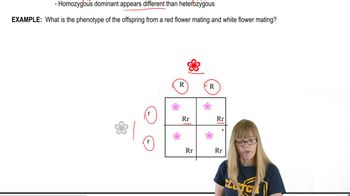Here are the essential concepts you must grasp in order to answer the question correctly.
Autosomal Dominant and Recessive Inheritance
Autosomal dominant inheritance occurs when a single copy of a mutated gene from one parent can cause a trait or disorder, leading to affected individuals in every generation. In contrast, autosomal recessive inheritance requires two copies of the mutated gene, often resulting in affected individuals appearing sporadically in a pedigree, typically when both parents are carriers. Understanding these patterns helps explain the differing occurrences of auditory neuropathy in families.
Recommended video:
Penetrance and Expressivity
Penetrance refers to the proportion of individuals with a specific genotype that actually express the associated phenotype, while expressivity describes the degree to which a genotype is expressed in an individual. In the context of auditory neuropathy, variable penetrance could explain why some family members with the same genetic mutation may have normal hearing, while others are affected, indicating that not all individuals with the mutation will exhibit the disorder.
Recommended video:
Penetrance and Expressivity
Mitochondrial Inheritance
Mitochondrial inheritance involves genes located in the mitochondria, which are passed exclusively from mother to offspring. This type of inheritance can lead to conditions that affect multiple family members across generations, particularly if the mother carries a mutation. In cases of auditory neuropathy, if the condition is linked to mitochondrial DNA, it could explain the presence of deafness in some family members while others remain unaffected.
Recommended video:
 Verified step by step guidance
Verified step by step guidance Verified video answer for a similar problem:
Verified video answer for a similar problem:

